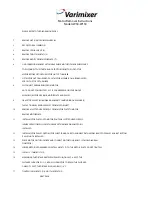
ENGLISH
OPERATION MANUAL
SYNQ
®
5/118
SMP12.22
This switch allows you to monitor the pre-fader channel input signal through the headphone outputs and the
control room outputs.
11. PFL INDICATOR
This indicator lights up when the PFL switch is turned on.
12. CHANNEL FADER
This is the channel’s main level control. It determines the level of the signal that is sent from the channel to
the master mixing, group outs and post fader effect busses. It is the settings of the input channel faders that
determine the mix, or the balance of sound levels between the instruments or other sources connected to the
inputs. When a channel is not being used, its fader should be set at the minimum position to prevent the
addition of unwanted noise to the main program signal.
MAIN CONTROL SECTION
1. DSP PROGRAM DISPLAY
The selected DSP effect number is shown on the display.
2. DSP PROGRAM SELECT SWITCH
Turn the program knob to select one of the 100 built-in
digital effects. The 24 Bit Digital Effects processor
provides high quality effects like Delay, Chorus and
Reverb.
3. AUX PRE CONTROL
Adjust the level of the signal sent from the internal
Digital effect to the AUX bus. Like this you can also
send for example some effect into your stage monitors
4. DSP ON/OFF SWITCH
This switch turns the internal digital effect on/off.
5. PFL SWITCH
Set this switch on if you wish to output the effect
signal to the PFL bus.
6. PFL INDICATOR
This indicator lights when the PFL switch is turned on.
7. EFX RTN Fader
Adjust the level of the signal sent from the internal
digital effect to the MAIN bus.
8. ALT 3/4 OUTPUT FADER
This fader adjusts the output level of the ALT GROUP.
9. TO MAIN SWITCH
When this switch is on, the output signal of the ALT
3/4 subgroup will be sent to the MAIN L/R busses.
10. MAIN L/R MASTER FADERS
Adjusts the final output level that is sent to the MAIN
L/R OUTPUTS.
11. LEVEL METER SIGNAL SWITCHES
These level-meter switches, together with the channel
PFL switches, select the signal that is sent to the
CONTROL ROOM OUT jacks, the HEADPHONE
jack, and the LEVEL METER.
If the input channel’s PFL switch is on
,
then only the channel’s PFL output is sent to
ENGLISH
OPERATION MANUAL
SYNQ
®
6/118
SMP12.22
the CONTROL ROOM OUT jacks, the HEADPHONE jack, and the LEVEL METER.
If the input channel’s PFL switch is off
, then the MAIN L/R signal, the ALT 3-4 signal or the
TAPE IN signal can be monitored via the CONTROL ROOM OUT jacks, the HEADPHONE jack, and
the LEVEL METER.
12. CTRL ROOM /PHONES CONTROL
Controls the signal output level of the PHONES and CONTROL ROOM outputs.
13. TAPE IN CONTROL
This knob controls the level of the playback signal that is coming from the TAPE IN RCA connectors, and
that will be routed to the MAIN L/R output.
14. MASTER AUX/FX SEND
• AUX Control
Controls the general output level of all the channel AUX signals, that will be sent to the AUX SEND jack
outputs.
• EFX Control
Controls the general output level of all the channel EFX signals, that will be sent to the EFFECT unit and to
the EFX jack output.
Remark: if this level is set to zero, no audio signal will be sent to the effect unit.
15. PFL INDICATOR
This indicator lights when a PFL switch is turned on
16. LEVEL METER
This LED display shows the level of the signal selected like described in the LEVEL METER SIGNAL
SWITCHES (11) above. The “0” point corresponds to the standard output level of +4dB.
17. RETURN CONTROL
• AUX Control
Adjust the level of the signal coming from the RETURN jacks (L (MONO) and R), routed to the AUX1 and
AUX2 Busses.
• MAIN Control
Adjusts the level of the signal coming from the RETURN jacks (L (MONO) and R), routed to the MAIN L/R
bus.
18. POWER INDICATOR
This indicator lights when power switch of the mixer is turned on.
19. PHANTOM POWER SWITCH
This switch toggles the phantom power on or off. If you set the switch on, the mixer supplies power to all channels that
provide XLR MIC input jacks.






































